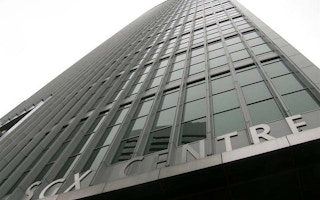The global consultancy that helped the Singapore stock exchange launch its first ever sustainability index has closed its Singapore office.
To continue reading, subscribe to Eco‑Business.
There's something for everyone. We offer a range of subscription plans.
- Access our stories and receive our Insights Weekly newsletter with the free EB Member plan.
- Unlock unlimited access to our content and archive with EB Circle.
- Publish your content with EB Premium.
Amsterdam-headquartered Sustainalytics was behind the launch of the SGX Sustainability Index in May 2016, but has pulled back after experiencing difficult market conditions in Singapore.
In a statement issued on Wednesday to Eco-Business, Sustainalytics’ US-based head of marketing Sarah Cohn said that the company’s other regional offices, Australia and Japan, presented bigger business opportunities than the city-state.
“The current market dynamics in Japan and Australia present significant opportunities for Sustainalytics. Therefore, we decided to open an office in Tokyo and to focus on growing our presence in Australia,” Cohn said.
“Given our size, we must deploy our resources effectively to respond best to market conditions, and we had to make the difficult decision to close our Singapore office. We remain committed to providing superior service to all of our clients in the Asia Pacific region,” she said.
The SGX Sustainability Index, which Sustainalytics helped to devise, is Singapore’s first set of equity indices focused on sustainability.
It was launched at a time when environment, social and governance (ESG) issues began to gain serious traction in a region that has been perceived as lagging behind the rest of the world.
Sustainalytics is also behind the region’s first corporate sustainability ranking, the Channel NewsAsia Sustainability Ranking, which was initially launched in 2014 in a partnership with the Singapore broadcaster and CSR Asia.
Demand for sustainability research is still relatively low in Singapore, and this could be the reason for Sustainalytics’s move, said observers.
Benjamin McCarron, the founder of Singapore-based Asia Research and Engagement, a responsible investment consultancy, commented that Australia and Japan, for instance, are some way ahead of Singapore in their adoption of sustainability research for financial reporting.
In Australia, he noted, many pension funds have had a long-standing interest in responsible investment, and this has supported the market for ESG research.
The same is true of Japan, McCarron added. Responsible investment has been driven in the last few years by a stewardship code drafted by the country’s Government Investment Pension Fund. The code pushes asset managers to integrate sustainability and governance considerations into their investment processes, and a market for ESG research has developed around it.
While Singapore has taken steps to develop the sustainable finance sector, sustainability research has been slow to take off.
“
It is hard to see broad market adoption of responsible investment tools in Singapore - unless there is stronger government support for responsible investment or one of the significant funds takes on a more visible role as champion
Benjamin McCarron, founder, Asia Research and Engagement
Last year, the Association of Banks in Singapore issued Guidelines on Responsible Financing that set a benchmark for responsible practices that the banks can incorporate into their business models.
Separately, industry players from Singapore’s investment community, backed by the Monetary Authority of Singapore and SGX, launched a set of principles late last year to encourage asset managers to act as responsible investors.
Known as Singapore’s Stewardship Principles and launched in November, it offers voluntary guidelines rather than a mandatory code that investors sign up to, McCarron noted. “As such it looks unlikely to play a significant role in encouraging investor adoption of tools to address the environmental and social aspects of ESG risks and opportunities,” he said.
“This is in contrast to other local markets - the Malaysian Code for Institutional Investors and Thailand’s proposed Investment Governance Code both include a much stronger emphasis on sustainability,” he said.
“Singapore can take steps to catch up with global peers. However, it is hard to see broad market adoption of responsible investment tools in Singapore - unless there is stronger government support for responsible investment or one of the significant funds takes on a more visible role as champion,” McCarron said.
In the meantime, McCarron said there is a “window of opportunity” for funds to use responsible investment tools, since deeper analysis of sustainability and governance issues offers the prospect of a performance edge and also a differentiated fund offering.
News of Sustainalytics’ withdrawal from Singapore emerges just five months after the company announced the launch of an office in Japan, adding to a regional presence in Sydney.
Researchers from Sustainalytics in Singapore, Loic Dujardin and Yumi Fujita, have moved to Tokyo to help start up that office.
Sustainalytics is one of the world’s leading companies in sustainability reporting. The firm launched in 1992, and has around 300 staff. The firm runs ESG research that covers 6,500 companies globally, and has worked with the likes of Morningstar, Glass Lewis, STOXX and Sustinvest.










